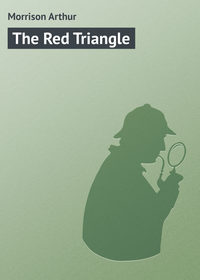 полная версия
полная версияThe Dorrington Deed-Box
"Well, yes," Mallows answered, a little reluctantly, but with something of modest pride in his manner, "that was the notion, since you speak so plainly."
"And it shall be the notion. All – everything – shall be as you have planned it, with one exception, which is this. The moving spirit shall divide his plunder with me."
"You? But – but – why, I gave you a hundred just now!"
"Dear, dear! Why will you harp so much on that vulgar little hundred? That's settled and done with. That's our little personal bargain in the matter of the lamentable accident with the chair. We are now talking of bigger business – not hundreds, but thousands, and not one of them, but a lot. Come now, a mind like yours should be wide enough to admit of a broad and large view of things. If I refrain from exposing this charming scheme of yours I shall be promoting a piece of scandalous robbery. Very well then, I want my promotion money, in the regular way. Can I shut my eyes and allow a piece of iniquity like this to go on unchecked, without getting anything by way of damages for myself? Perish the thought! When all expenses are paid, and the confederates are sent off with as little as they will take, you and I will divide fairly, Mr. Mallows, respectable brothers in rascality. Mind, I might say we'd divide to begin with, and leave you to pay expenses, but I am always fair to a partner in anything of this sort. I shall just want a little guarantee, you know – it's safest in such matters as these; say a bill at six months for ten thousand pounds – which is very low. When a satisfactory division is made you shall have the bill back. Come – I have a bill-stamp ready, being so much convinced of your reasonableness as to buy it this morning, though it cost five pounds."
"But that's nonsense – you're trying to impose. I'll give you anything reasonable – half is out of the question. What, after all the trouble and worry and risk that I've had – "
"Which would suffice for no more than to put you in gaol if I held up my finger!"
"But hang it, be reasonable! You're a mighty clever man, and you've got me on the hip, as I admit. Say ten per cent."
"You're wasting time, and presently the men will be back. Your choice is between making half, or making none, and going to gaol into the bargain. Choose!"
"But just consider – "
"Choose!"
Mallows looked despairingly about him. "But really," he said, "I want the money more than you think. I – "
"For the last time – choose!"
Mallows's despairing gaze stopped at the enamelling oven. "Well, well," he said, "if I must, I must, I suppose. But I warn you, you may regret it."
"Oh dear no, I'm not so pessimistic. Come, you wrote a cheque – now I'll write the bill. 'Six months after date, pay to me or my order the sum of ten thousand pounds for value received' – excellent value too, I think. There you are!"
When the bill was written and signed, Mallows scribbled his acceptance with more readiness than might have been expected. Then he rose, and said with something of brisk cheerfulness in his tone, "Well, that's done, and the least said the soonest mended. You've won it, and I won't grumble any more. I think I've done this thing pretty neatly, eh? Come and see the 'works.'"
Every other part of the place was empty of machinery. There were a good many finished frames and wheels, bought separately, and now in course of being fitted together for sale; and there were many more complete bicycles of cheap but showy make to which nothing needed to be done but to fix the red and gold "transfer" of the "Avalanche" company. Then Mallows opened the tall iron door of the enamelling oven.
"See this," he said; "this is the enamelling oven. Get in and look round. The frames and other different parts hang on the racks after the enamel is laid on, and all those gas jets are lighted to harden it by heat. Do you see that deeper part there by the back? – go closer."
Dorrington felt a push at his back and the door was swung to with a bang, and the latch dropped. He was in the dark, trapped in a great iron chamber. "I warned you," shouted Mallows from without; "I warned you you might regret it!" And instantly Dorrington's nostrils were filled with the smell of escaping gas. He realised his peril on the instant. Mallows had given him the bill with the idea of silencing him by murder and recovering it. He had pushed him into the oven and had turned on the gas. It was dark, but to light a match would mean death instantly, and without the match it must be death by suffocation and poison of gas in a very few minutes. To appeal to Mallows was useless – Dorrington knew too much. It would seem that at last a horribly-fitting retribution had overtaken Dorrington in death by a mode parallel to that which he and his creatures had prepared for others. Dorrington's victims had drowned in water – or at least Crofton's had, for I never ascertained definitely whether anybody had met his death by the tank after the Croftons had taken service with Dorrington – and now Dorrington himself was to drown in gas. The oven was of sheet iron, fastened by a latch in the centre. Dorrington flung himself desperately against the door, and it gave outwardly at the extreme bottom. He snatched a loose angle-iron with which his hand came in contact, dashed against the door once more, and thrust the iron through where it strained open. Then, with another tremendous plunge, he drove the door a little more outward and raised the angle-iron in the crack; then once more, and raised it again. He was near to losing his senses, when, with one more plunge, the catch of the latch, not designed for such treatment, suddenly gave way, the door flew open, and Dorrington, blue in the face, staring, stumbling and gasping, came staggering out into the fresher air, followed by a gush of gas.
Mallows had retreated to the rooms behind, and thither Dorrington followed him, gaining vigour and fury at every step. At sight of him the wretched Mallows sank in a corner, sighing and shivering with terror. Dorrington reached him and clutched him by the collar. There should be no more honour between these two thieves now. He would drag Mallows forth and proclaim him aloud; and he would keep that £10,000 bill. He hauled the struggling wretch across the room, tearing off the crêpe whiskers as he came, while Mallows supplicated and whined, fearing that it might be the other's design to imprison him in the enamelling oven. But at the door of the room against that containing the oven their progress came to an end, for the escaped gas had reached the lighted candle, and with one loud report the partition wall fell in, half burying Mallows where he lay, and knocking Dorrington over.
Windows fell out of the building, and men broke through the front gate, climbed into the ruined rooms and stopped the still escaping gas. When the two men and the boy returned, with the conspirator who had been in charge of the works, they found a crowd from the hardware and cycle factories thereabout, surveying with great interest the spectacle of the extrication of Mr. Paul Mallows, managing director of the "Indestructible Bicycle Company," from the broken bricks, mortar, bicycles and transfers of the "Avalanche Bicycle and Tyre Company, Limited," and the preparations for carrying him to a surgeon's where his broken leg might be set. As for Dorrington, a crushed hat and a torn coat were all his hurts, beyond a few scratches. And in a couple of hours it was all over Birmingham, and spreading to other places, that the business of the "Avalanche Bicycle and Tyre Company" consisted of sticking brilliant labels on factors' bicycles, bought in batches; for the whole thing was thrown open to the general gaze by the explosion. So that when, next day, Lant won the fifty miles race in London, he was greeted with ironical shouts of "Gum on yer transfer!" "Hi! mind yer label!" "Where did you steal that bicycle?" "Sold yer shares?" and so forth.
Somehow the "Avalanche Bicycle and Tyre Company, Limited," never went to allotment. It was said that a few people in remote and benighted spots, where news never came till it was in the history books, had applied for shares, but the bankers returned their money, doubtless to their extreme disappointment. It was found politic, also, that Mr. Paul Mallows should retire from the directorate of the "Indestructible Bicycle Company" – a concern which is still, I believe, flourishing exceedingly.
As for Dorrington, he had his hundred pounds reward. But the bill for £10,000 he never presented. Why, I do not altogether know, unless he found that Mr. Mallows's financial position, as he had hinted, was not altogether so good as was supposed. At any rate, it was found among the notes and telegrams in this case in the Dorrington deed-box.
V
THE CASE OF MR. LOFTUS DEACON
IThis was a case that helped to give Dorrington much of that reputation which unfortunately too often enabled him to profit himself far beyond the extent to which his clients intended. It occurred some few years back, and there was such a stir at the time over the mysterious death of Mr. Loftus Deacon that it well paid Dorrington to use his utmost diligence in an honest effort to uncover the mystery. It gave him one of his best advertisements, though indeed it occasioned him less trouble in the unravelling than many a less interesting case. There were scarcely any memoranda of the affair among Dorrington's papers, beyond entries of fees paid, and I have almost entirely relied upon the account given me by Mr. Stone, manager in the employ of the firm owning the premises in which Mr. Deacon died.
These premises consisted of a large building let out in expensive flats, one of the first places built with that design in the West-End of London. The building was one of three, all belonging to the firm I have mentioned, and numbered 1, 2 and 3, Bedford Mansions. They stood in the St. James's district, and Mr. Loftus Deacon's quarters were in No. 2.
Mr. Deacon's magnificent collection of oriental porcelain will be remembered as long as any in the national depositories; much of it was for a long while lent, and, by Mr. Deacon's will, passed permanently into possession of the nation. His collection of oriental arms, however, was broken up and sold, as were also his other innumerable objects of Eastern art – lacquers, carvings, and so forth. He was a wealthy man, this Mr. Deacon, a bachelor of sixty, and his whole life was given to his collections. He was currently reported to spend some £15,000 a year on them, and, in addition, would make inroads into capital for special purchases at the great sales. People wondered where all the things were kept. And indeed they had reason, for Mr. Deacon's personal establishment was but a suite of rooms on the ground floor of Bedford Mansions. But the bulk of the collections were housed at various museums – indeed it was a matter of banter among his acquaintances that Mr. Loftus Deacon made the taxpayers warehouse most of his things; moreover, the flat was a large one – it occupied almost the whole of the ground-floor of the building, and it overflowed with the choicest of its tenant's possessions. There were eight large and lofty rooms, as well as the lobby, scullery and so forth, and every one was full. The walls were hung with the most precious kakemono and nishikiyé of Japan; and glass cabinets stood everywhere, packed with porcelain and faience – celadon, peach-bloom, and blue and white, Satsuma, Raku, Ninsei, and Arita – many a small piece worth its weight in gold over and over and over again. At places on the wall, among the kakemono and pictures of the ukioyé, were trophies of arms. Two suits of ancient Japanese armour, each complete and each the production of one of the most eminent of the Miochin family, were exhibited on stands, and swords stood in many corners and lay in many racks. Innumerable drawers contained specimens of the greatest lacquer ware of Korin, Shunshō, Kajikawa, Koyetsu, and Ritsuo, each in its wadded brocade fukusa with the light wooden box encasing all. In more glass cabinets stood netsuké and okimono of ivory, bronze, wood, and lacquer. There were a few gods and goddesses, and conspicuous among them two life-sized gilt Buddhas beamed mildly over all from the shelves on which they were raised. By the operation of natural selection it came about that the choicest of all Mr. Deacon's possessions were collected in these rooms. Here were none of the great cumbersome pots, good in their way, but made of old time merely for the European market. Of all that was Japanese every piece was of the best and rarest, consequently, in almost every case, of small dimensions, as is the way of the greatest of the wares of old Japan. And of all the precious contents of these rooms everything was oriental in its origin except the contents of one case, which displayed specimens of the most magnificent goldsmiths' and silver-smiths' work of mediæval Europe. It stood in the room which Mr. Loftus Deacon used as his sitting-room, and more than one of his visitors had wondered that such valuable property was not kept at a banker's. This view, however, always surprised and irritated Mr. Deacon. "Keep it at a banker's?" he would say. "Why not melt it down at once? The things are works of art, things of beauty, and that's why I have them, not merely because they're gold and silver. To shut them up in a strong-room would be the next thing to destroying them altogether. Why not lock the whole of my collections in safes, and never look at them? They are all valuable. But if they are not to be seen I would rather have the money they cost." So the gold and silver stood in its case, to the blinking wonderment of messengers and porters whose errands took them into Mr. Loftus Deacon's sitting-room. The contents of this case were the only occasion, however, of Mr. Deacon's straying from oriental paths in building up his collection. There they stood, but he made no attempt to add to them. He went about his daily hunting, bargaining, cataloguing, cleaning, and exhibiting to friends, but all his new treasures were from the East, and most were Japanese. His chief visitors were travelling buyers of curiosities; little Japanese who had come to England to study medicine and were paying their terms by the sale of heirlooms in pottery and lacquer; porters from Christie's and Foster's; and sometimes men from Copleston's – the odd emporium by the riverside where lions and monkeys, porcelain and savage weapons were bought and sold close by the ships that brought them home. The travellers were suspicious and cunning; the Japanese were bright, polite, and dignified, and the men from Copleston's were wiry, hairy and amphibious; one was an enormously muscular little hunchback nicknamed Slackjaw – a quaint and rather repulsive compound of showman, sailor and half-caste rough; and all were like mermen, more or less. These curious people came and went, and Mr. Deacon went on buying, cataloguing, and joying in his possessions. It was the happiest possible life for a lonely old man with his tastes and his means of gratifying them, and it went placidly on till one Wednesday mid-day. Then Mr. Deacon was found dead in his rooms in most extraordinary and, it seemed, altogether unaccountable circumstances.
There was but one door leading into Mr. Deacon's rooms from the open corridor of the building, and this was immediately opposite the large street door. When one entered from the street one ascended three or four broad marble steps, pushed open one of a pair of glazed swing doors and found oneself facing the door by which Mr. Deacon entered and left his quarters. There had originally been other doors into the corridor from some of the rooms, but those Mr. Deacon had had blocked up, so making the flat entirely self-contained. Just by the glazed swing doors which I have spoken of, and in full view of the old gentleman's door, the hall-porter's box stood. It was glazed on all sides, and the porter sat so that Mr. Deacon's door was always before his eyes, and, so long as he was there, it was very unlikely that anybody or anything could leave or enter by that door unobserved by him. It is important to remember this, in view of what happened on the occasion I am writing of. There was one other exterior door to Mr. Deacon's flat, and one only. It gave upon the back spiral staircase, and was usually kept locked. This staircase had no outlet to the corridors, but merely extended from the housekeeper's rooms at the top of the building to the basement. It was little used, and then only by servants, for it gave access only to the rooms on its own side. There was no way from this staircase to the outer street except through the private rooms of the tenants, or through those of the housekeeper.
That Wednesday morning things had happened precisely in the ordinary way. Mr. Deacon had risen and breakfasted as usual. He was alone, with his newspaper and his morning letters, when his breakfast was taken in and when it was removed. He had remained in his rooms till between twelve and one o'clock. Goods had arrived for him (this was an almost daily occurrence), and one or two ordinary visitors had called and gone away again. It was Mr. Deacon's habit to lunch at his club, and at about a quarter to one, or thereabout, he had come out, locked his door, and leaving his usual message that he should be at the club for an hour or two, in case anybody called, he had left the building. At about one, however, he had returned hurriedly, having forgotten some letters. "I didn't give you any letters for the post, did I, Beard, before I went out?" he asked the porter. And the porter replied that he had not. Mr. Deacon thereupon croosed the corridor, entered his door, and shut it behind him.
He had been gone but a few seconds, when there arose an outcry from within the rooms – a shout followed in a breath by a loud cry of pain, and then silence. Beard, the porter, ran to the door and knocked, but there was no reply. "Did you call, sir?" he shouted, and knocked again, but still without response. The door was shut, and it had a latch lock with no exterior handle. Beard, who had had an uncle die of apoplexy, was now thoroughly alarmed, and shouted up the speaking-tube for the housekeeper's keys. In course of a few minutes they were brought, and Beard and the housekeeper entered.
The lobby was as usual, and the sitting-room was in perfect order. But in the room beyond Mr. Loftus Deacon lay in a pool of blood, with two large and fearful gashes in his head. Not a soul was in any of the rooms, though the two men, first shutting the outer door, searched diligently. All windows and doors were shut, and the rooms were tenantless and undisturbed, except that on the floor lay Mr. Deacon in his blood at the foot of a pedestal whereupon there squatted, with serenely fierce grin, the god Hachiman, gilt and painted, carrying in one of his four hands a snake, in another a mace, in a third a small human figure, and in the fourth a heavy, straight, guardless sword; and all around furniture, cabinets, porcelain, lacquer and everything else lay undisturbed.
At first sight of the tragedy the porter had sent the lift-man for the police, and soon they arrived, and a surgeon with them. For the surgeon there was very little to do. Mr. Deacon was dead. Either of the two frightful gashes in the head would have been fatal, and they had obviously both been delivered with the same instrument – something heavy and exceedingly sharp.
The police now set themselves to close investigation. The porter was certain that nobody had entered the rooms that morning who had not afterwards left. He was sure that nobody had entered unobserved, and he was sure that Mr. Deacon had re-entered his chambers unaccompanied. Working, therefore, on the assumption that the murderer could not have entered by the front door, the police turned their attention to the back door and the windows. The door to the back staircase was locked, and the key was in the lock and inside. Therefore they considered the windows. There were but three of these that looked upon the street, two in one room and one in another, but these were shut and fastened within. Other rooms were lighted by windows looking upon lighting-wells, some being supplied with reflectors. All these windows were found to be quite undisturbed, and fastened within, except one. This window was in the bedroom, and, though it was shut, the catch was not fastened. The porter declared that it was Mr. Deacon's practice invariably to fasten every shut window, a thing he was always very careful about. Moreover, the window now found unfastened and shut was always left open a foot or so all day, to air the bedroom. More, a housemaid was brought who had that morning made the bed and dusted the room. The window was opened, she said, when she had entered the room, and she had left it so, as she always did. Therefore, shut as it was, but not fastened, it seemed plain that this window must have given exit to the murderer, since no other way appeared possible. Also, to shut the window behind him would be the fugitive's natural policy. The lower panes were of ground glass, and at least pursuit would be delayed.
The window looked upon a lighting-well, and the concreted floor of the basement was but fifteen or twenty feet below. Careful inquiries disclosed the fact that a man had been at work painting the joinery about this well-bottom. He was a man of very indifferent character – had in fact "done time" – and he was employed for odd jobs by way of charity, being some sort of connection of a member of the firm owning the buildings. He had, indeed, received a good education, fitted to place him in a very different position from that in which he now found himself, but he was a black sheep. He drank, he gambled, and finally he stole. His relatives helped him again and again, but their efforts were useless, and now he was indebted to one of them for his present occupation at a pound a week. The police, of course, knew something of him, and postponed questioning him directly until they had investigated a little further. It might be that Mr. Deacon's death was the work of a conspiracy wherein more than one had participated.
IIThe next morning (Thursday) Mr. Henry Colson was an early caller at Dorrington's office. Mr. Colson was a thin, grizzled man of sixty or thereabout, who had been a close friend – the only intimate friend, indeed – of Mr. Loftus Deacon. He was a widower, and he lived in rooms scarce two hundred yards distant from Bedford Mansions, where his friend had died.
"My business, Mr. Dorrington," he said, "is in connection with the terrible death of my old friend Mr. Loftus Deacon, of which you no doubt have heard or read in the morning papers."
"Yes," Dorrington assented, "both in this morning's papers and the evening papers of yesterday."
"Very good. I may tell you that I am sole executor under Mr. Deacon's will. The will indeed is in my possession (I am a retired solicitor), and there happens to be a sum set apart in that will out of which I am to defray any expenses that may arise in connection with his death. It really seems to me that I should be quite justified in using some part of that sum in paying for inquiries to be conducted by such an experienced man as yourself, into the cause of my poor friend's death. At any rate, I wish you to make such inquiries, even if I have to pay the fees myself. I am convinced that there is something very extraordinary – something very deep – in the tragedy. The police are pottering about, of course, and keeping very mysterious as to the matter, but I expect that's simply because they know nothing. They have made no arrest, and perhaps every minute of delay is making the thing more difficult. As executor, of course, I have access to the rooms. Can you come and look at them now?"
"Oh yes," Dorrington answered, reaching for his hat. "I suppose there's no doubt of the case being one of murder? Suicide is not likely, I take it?"
"Oh no – certainly not. He was scarcely the sort of man to commit suicide, I should say. And he was as cheerful as he could be the afternoon before, when I last saw him. Besides, the surgeon says it's nothing of the kind. A man committing suicide doesn't gash himself twice over the head, or even once. And in this case the first blow would have made him incapable of another."
"I have heard nothing about the weapon," Dorrington remarked, as they entered a cab. "Has it been found?"
"That's a difficulty," Mr. Colson answered. "It would seem not. Of course there are numbers of weapons about the place – Japanese swords and what not – any one of which might have caused such injuries. But there are no bloodstains on any of them."






